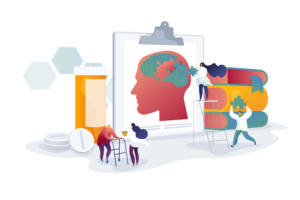The Federal government invests over $3 billion dollars each year in research on Alzheimer’s disease and Alzheimer’s disease related dementias (AD/ADRD). Research in biomedical sciences have deepened our understanding of the aging brain and pathophysiology of AD/ADRD but therapies to prevent or slow the disease’s progression have largely alluded us.
To engage and inform social scientists on the biomedical and clinical foundations of ADRD, the second annual Science of ADRD for Social Scientists workshop was held at USC’s University Park Campus last month.
Twelve world-renowned biomedical and clinical experts presented research on a range of topics, including the latest science on vascular links to dementia, genetic markers and the effects of poor air quality on cognitive decline. “Social science research in the area of dementia is more rigorous and higher impact when it is informed by the biomedical foundations of the disease and clinical context of care,” Julie Zissimopoulos, co-director of the Aging and Cognition Program at the USC Schaeffer Center told those gathered at the opening of the workshop. “Furthermore, behavioral and social science research should be a foundational part of our strategy to address the challenges dementia brings and improve the lives of those affected by it.” Zissimopoulos is a professor at the Price School of Public Policy and the co-director of two NIH-funded research centers that are housed at the Schaeffer Center and funded the event: the Center for Advancing Sociodemographic and Economics Study of Alzheimer’s Disease and Related Dementias and the USC AD Resource Center for Minority Aging Research.
Sign up for Schaeffer Center news
Alzheimer’s disease impacts all communities
Without new treatments, the numbers of Americans living with dementia is expected to climb to 12 million by 2040. Rural, low-income and communities of color will be especially vulnerable to the increased burden of this disease.
This year alone, medical and unpaid care costs for the estimated 6.5 million people living with dementia are expected to total more than $592 billion. These costs are largely borne by individuals with dementia, as well as their family and caregivers.
Social scientists are uniquely poised to evaluate the implications of these costs, the population risk factors, and community and policy gaps that are causing disparities, yet they often lack knowledge of the biomedical foundations of Alzheimer’s disease and other dementias. To address this gap, the two-day workshop hosted a series of lectures and small group discussions. Forty-two social scientists at all career stages representing 25 institutions attended the conference. Participant fields of expertise included economics, sociology and gerontology, among others.
Miesha Williams, an assistant professor and economist at Spelman University is developing a new portfolio of dementia research on the link between earning, risk tolerance and cognitive health. “The interdisciplinary focus was really my favorite part,” said Williams. “Seeing how social scientists can contribute to preventative research while basic and clinical scientists develop medicines to reduce cognitive decline was so special and informative.”
A keynote address on cognitive aging research in the social sciences was provided by Eileen Crimmins. Paul Aisen, David Bennett, Helena Chui, Sean Curran, Caleb Finch, Margaret Gatz, Duke Han, Neda Jahanshad, Jinkook Lee, Elizabeth Necka, David Reuben, and Claire Sexton gave presentations. Visit the workshop website for additional information on speakers, participants and organizers.
More about the Schaeffer Center’s Aging and Cognition Research Program can be found here.
Funding for the conference was provide by the Center for Advancing Sociodemographic and Economics Study of Alzheimer’s Disease and Related Dementias (CeASES ADRD) (award number P30AG066589) and the USC AD Resource Center for Minority Aging Research (USC AD RCMAR) (award number P30AG043073).


